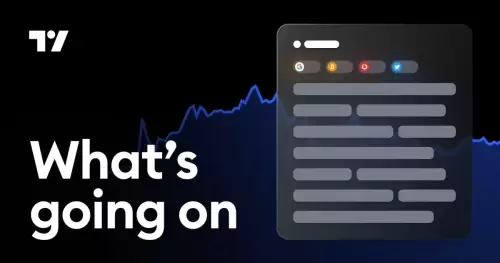 |
|
 |
|
 |
|
 |
|
 |
|
 |
|
 |
|
 |
|
 |
|
 |
|
 |
|
 |
|
 |
|
 |
|
 |
|
Cryptocurrency News Articles
CVector, Industrial AI, and Critical Infrastructure: Building Trust in a High-Stakes World
Jul 25, 2025 at 03:20 am
CVector redefines trust in Industrial AI for critical infrastructure by prioritizing long-term commitment, addressing key concerns in high-stakes industries.

In the dynamic realm of Industrial AI and critical infrastructure, trust and longevity are paramount. CVector, an Industrial AI startup, is making waves by placing long-term commitment ahead of quick wins. Let’s dive into how they’re reshaping customer trust in this vital sector.
CVector's Core Philosophy: Independence and Longevity
CVector's founders, Richard Zhang and Tyler Ruggles, understand the anxieties of clients in industries like manufacturing and energy. The big question? "Will you still be here in six months? A year?" CVector's answer is a resounding commitment to independence, positioning them as a reliable partner where many AI startups are acquired for talent. This focus on stability is music to the ears of critical infrastructure operators who need solutions that last.
Expertise That Bridges the Gap
What sets CVector apart is the founders’ deep understanding of industrial operations. Zhang’s background at Shell and Ruggles’ experience at the Large Hadron Collider give them unique insights. This allows CVector to communicate effectively with clients, offering tailored solutions for challenges like real-time energy pricing and legacy system compatibility. Their AI, dubbed the “brain and nervous system for industrial assets,” combines fintech, real-time data analytics, and open-source tools to create adaptive AI agents. Imagine an AI that spots how road salt entering factories can affect equipment—that’s the level of detail they bring.
Fueling Growth with Trust-Based Investment
CVector's recent $1.5 million pre-seed funding, led by Schematic Ventures, underscores their commitment to long-term growth. Investors like Julian Counihan emphasize that trust in AI startups depends on the alignment between founders and customers. CVector’s focus on recruiting “mission-aligned” team members and avoiding acquihire scenarios solidifies this trust. While contracts can help, Counihan believes that “true assurance comes down to founders being mission-aligned.”
Scaling AI Solutions Across Industries
With a team spanning Providence, New York City, and Frankfurt, CVector is ready to scale its AI deployments in sectors like chemicals, automotive, and energy. They're tackling challenges like outdated grid dispatch systems, offering operators low-latency insights and better control. This practical application of AI is a game-changer for industries reliant on stable and efficient operations.
The Broader Trend: Trust in Industrial AI
CVector’s growth highlights the increasing importance of trust in adopting Industrial AI. By blending domain-specific expertise with innovative tech, they’re filling a market gap where reliability and longevity are key. Zhang envisions scaling to “large-scale critical infrastructure,” reflecting a broader shift toward AI solutions that prioritize stability. As Ruggles points out, the move from theoretical research to tangible applications—like optimizing factory operations—shows the real-world impact of their work.
Cybersecurity Risks to Critical Infrastructure
The UNC3886 incident in Singapore highlights a growing global risk: cyber threats to critical infrastructure. This advanced persistent threat (APT), linked to state-sponsored cyber espionage, targeted Singapore's energy, healthcare, finance, and transport sectors. This event underscores the urgent need for investors to reassess portfolios through a cybersecurity lens, prioritizing defensive sectors and innovative tech firms focused on digital resilience.
Investing in a Secure Future
Cybersecurity has become a defensive play in an age of escalating digital threats. Companies specializing in endpoint protection, threat intelligence, and zero-trust architectures are gaining traction. Defensive sectors like utilities and healthcare are also increasingly intertwined with digital security, requiring significant investments in cyber-hardening. Diversification is key, balancing exposure to cybersecurity innovation with hedging against systemic shocks.
Final Thoughts
CVector's unwavering commitment to trust, combined with the rising importance of cybersecurity, paints a clear picture: the future of Industrial AI in critical infrastructure hinges on stability, reliability, and resilience. So, next time you think about AI, remember it’s not just about the tech—it’s about the people and the mission behind it. And maybe, just maybe, that AI can even spot the road salt before it wreaks havoc. Who knew?
Disclaimer:info@kdj.com
The information provided is not trading advice. kdj.com does not assume any responsibility for any investments made based on the information provided in this article. Cryptocurrencies are highly volatile and it is highly recommended that you invest with caution after thorough research!
If you believe that the content used on this website infringes your copyright, please contact us immediately (info@kdj.com) and we will delete it promptly.






























































